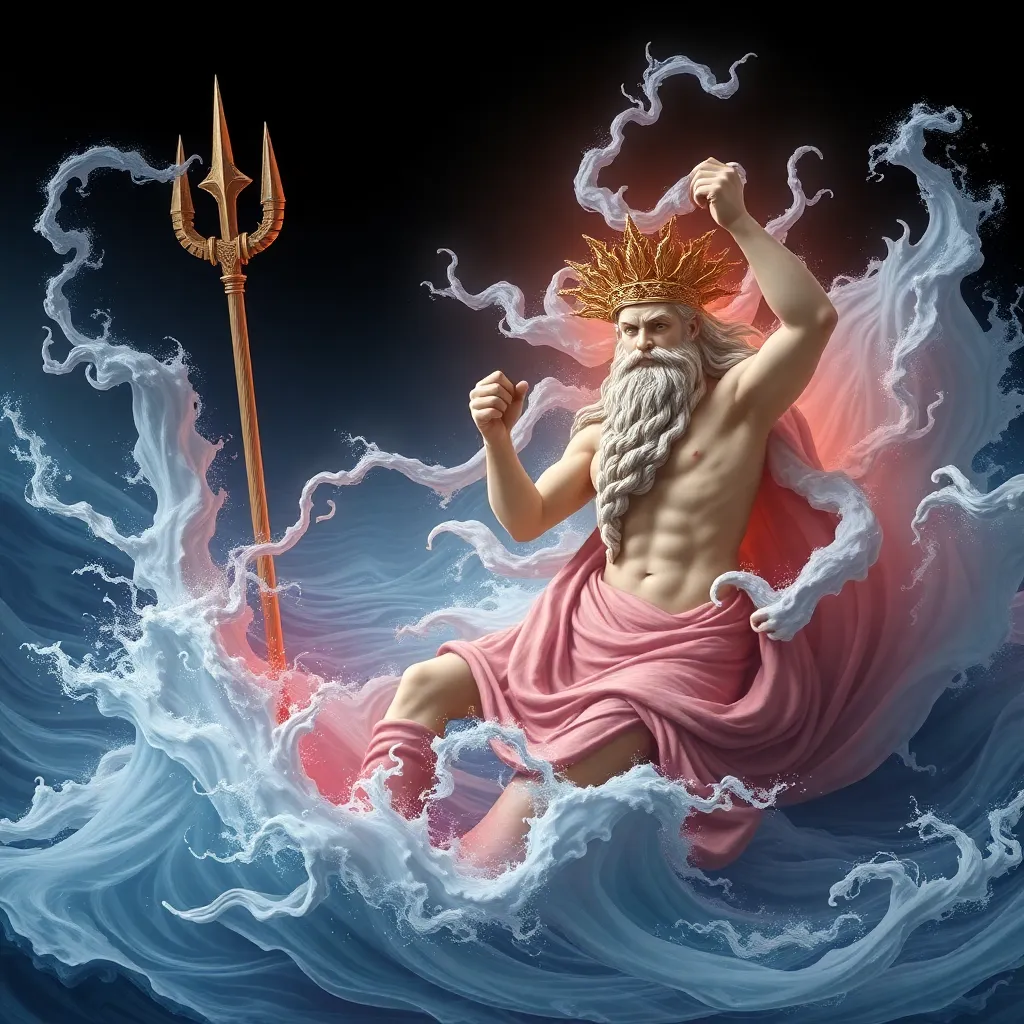The Connection Between Poseidon and the Concept of Chaos
I. Introduction
In the rich tapestry of Greek mythology, Poseidon stands out as one of the most powerful deities, revered as the god of the sea, earthquakes, and horses. His character embodies the majesty and terror of the ocean, reflecting the duality of nature itself. At the same time, ancient Greeks had a profound understanding of chaos, a primordial state that preceded the establishment of order in the cosmos. This article explores the intricate relationship between Poseidon and chaos, revealing deeper insights into ancient Greek cosmology and the nature of the sea.
II. Poseidon: The God of the Sea
Poseidon, the son of Cronus and Rhea, was one of the twelve Olympian gods. He wielded a trident, a three-pronged spear that symbolized his dominion over the waters. His attributes included:
- The Trident: A powerful weapon that could create storms and earthquakes.
- The Horse: Often associated with Poseidon, he was also regarded as the god of horses.
- The Sea: Representing both the nurturing and destructive aspects of the ocean.
Poseidon held significant importance in Greek mythology and culture. He was worshiped in various regions, especially coastal areas, where he was seen as a provider of safe passage for sailors and a source of bounty from the sea. As one of the Olympian gods, his role was pivotal in the pantheon, often depicted as a temperamental figure whose moods could influence the natural world.
III. Understanding Chaos in Ancient Greek Thought
In ancient Greek mythology, chaos is defined as the void or the primordial state of existence before the creation of the cosmos. It was not merely disorder but a vast, formless expanse that existed before the gods shaped the universe. Key characteristics of chaos include:
- Primordial State: Chaos represents the initial condition of the universe.
- Lack of Order: Unlike cosmos, which signifies harmony and order, chaos is characterized by unpredictability.
- Creation Myths: Chaos plays a crucial role in various creation myths where order emerges from this formless state.
Understanding chaos in this context highlights the ancient Greeks’ perception of the universe’s origins and the delicate balance between order and disorder.
IV. The Sea as a Symbol of Chaos
The ocean is often seen as a powerful symbol of chaos due to its unpredictable nature. Storms can arise suddenly, and the depths are mysterious and largely unexplored. Poseidon, as the god of the sea, embodies these chaotic aspects. His temperament reflects the dual nature of the ocean:
- Calm and Nurturing: The sea provides sustenance and beauty.
- Fierce and Destructive: The ocean can unleash devastating storms and floods.
Numerous myths illustrate Poseidon’s chaotic powers. For instance, the story of the Trojan War highlights his wrath when he unleashed a sea monster upon the city of Troy as punishment for the slight against him.
V. Poseidon’s Interactions with Other Gods and Mortals
Poseidon’s chaotic nature often manifested in conflicts with both gods and mortals. His interactions reveal the precarious balance between divine authority and human affairs:
- Conflicts with Athena: Poseidon’s rivalry with Athena over the patronage of Athens led to chaos in the city, resulting in his wrath.
- The Flood: In myths, Poseidon can cause catastrophic floods as a response to human arrogance or disrespect.
- Mortal Punishments: His vengeance upon sailors who disrespected him often resulted in shipwrecks and loss of life.
The impact of Poseidon’s chaos on human affairs underscores the ancient Greeks’ belief in the gods’ direct influence on their lives and the importance of reverence towards divine powers.
VI. Artistic Representations of Poseidon and Chaos
In ancient art and literature, Poseidon is frequently depicted in ways that symbolize his chaotic nature. Artistic representations include:
- Pottery: Vases often illustrate scenes of Poseidon in action, showcasing his power over the sea.
- Statues: Sculptures capture his formidable presence, emphasizing the trident as a symbol of his authority.
- Literature: Epic poems, such as Homer’s “Iliad,” depict Poseidon’s influence over both gods and mortals.
These artistic interpretations not only reflect Poseidon’s chaotic nature but also serve as a means of understanding the ancient Greeks’ perception of the divine and nature.
VII. The Legacy of Poseidon and Chaos in Modern Culture
The legacy of Poseidon and the concept of chaos continues to resonate in modern culture. His character appears in various forms of literature and media, from films to books, where he is often portrayed as a deity of great power and unpredictability. Themes of chaos are recurrent in contemporary narratives, illustrating how:
- Literature: Modern authors draw upon Poseidon’s chaotic nature to explore themes of power and nature.
- Media: Films and video games often depict Poseidon as a character representing the sea’s ferocity.
- Nature and Divinity: The connection between chaos and the natural world remains significant, influencing how people view environmental forces.
This connection shapes modern understandings of nature, divinity, and the importance of respecting the natural world.
VIII. Conclusion
In summary, the exploration of the connection between Poseidon and chaos reveals vital aspects of ancient Greek cosmology. Poseidon embodies the duality of the sea—both nurturing and destructive—while chaos represents the primordial state from which order emerges. Understanding these concepts provides insights into ancient beliefs and their relevance today, highlighting the ongoing significance of nature’s unpredictable forces and the need for respect towards them.




